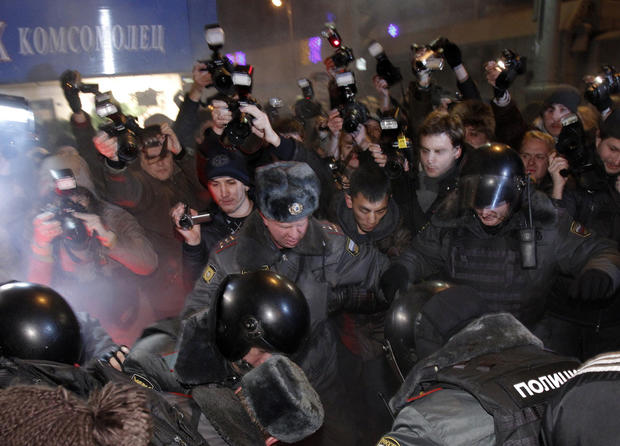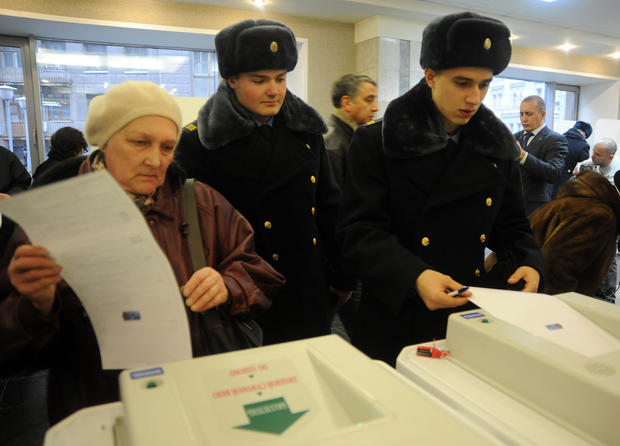Putin's grip on Russian politics slips
Updated 11:56 p.m. ET
MOSCOW - Prime Minister Vladimir Putin's party struggled to hang onto its majority in Russia's parliamentary election, results showed Monday, suggesting Russians were wearying of the man who has dominated Russian politics for more than a decade.
Rival parties and election monitors said even a result of around 50 percent was inflated, alleging ballot-stuffing and other significant violations at the polls. Many expressed fears that the vote count would be manipulated.
Putin wanted to see his United Russia party do well in Sunday's election as a sign of popular support for his return to the presidency in a vote now three months away. Despite the sobering setback, he was still expected to have little trouble reclaiming the position he held from 2000 to 2008.
Putin has systematically destroyed any potential challengers and most Russians do not see any credible alternatives, despite growing dissatisfaction with his strongman style. Grumbling over pervasive official corruption and the gap between ordinary people and the superrich has become widespread.
Exit polls show Putin's party losing groundElection violations alleged as Russians vote
Putting a positive spin on the disappointing returns, Putin said "we can ensure the stable development of the country with this result." But he appeared glum when speaking to supporters at United Russia headquarters and limited his remarks to a terse statement.
United Russia held a two-thirds majority in the outgoing State Duma, which allowed it to change the constitution unchallenged. But the party is increasingly disliked, seen as representing a corrupt bureaucracy and known to many as the "party of crooks and thieves."
The Communist Party appeared to benefit from the protest vote, with exit polls and the early returns predicting it would get nearly 20 percent, up from less than 12 percent four years ago.
But Putin should still have no serious difficulties getting his laws passed. The two other parties in parliament also looked set to gain seats, and both have consistently voted with United Russia. Even the Communists pose only tempered opposition.
The results with over 92 percent of the precincts counted showed 49.8 percent for United Russia. This was in line with an exit poll conducted by the VTsIOM polling agency that had United Russia tallying 48.5 percent and another done by the FOM polling agency that had it winning 46 percent of the vote. The two polls were reported by the two state television channels.
Complete results were expected at 0600 GMT Monday (1 a.m. EDT).
About 60 percent of Russia's 110 million registered voters cast ballots, down from 64 percent four years ago.
Only seven parties were allowed to field candidates for parliament this year, while the most vocal opposition groups were barred.
Several parties complained Sunday of extensive election violations aimed at boosting United Russia's vote count, including party observers being hindered in their work.
Communist leader Gennady Zyuganov said his party monitors thwarted an attempt to stuff a ballot box at a Moscow polling station where they found 300 ballots already in the box before the start of the vote.
He said incidents of ballot-stuffing were reported at several other stations in Moscow, Rostov-on-Don and other areas. In the southern city of Krasnodar, unidentified people posing as Communist monitors had shown up at polling stations and the real observers from the party weren't allowed in, Zyuganov said.
Russia's only independent election monitoring group, Golos, has come under strong official pressure and its website was incapacitated by hackers on Sunday. Golos was still able to field more than 2,000 observers, and they reported numerous violations, director Liliya Shibanova said.
She said many of the violations involved absentee ballots, including so-called "cruise" or "carousel" voting where people with the ballots are bused to multiple polling stations. Many people complained that they were forced to get absentee ballots and hand them over to their bosses.
Shibanova said some of the worst violation were in the Volga River city of Samara, where observers and election commission members from opposition parties were barred from verifying that the ballot boxes were properly sealed at all polling stations.
Social media were flooded with messages reporting violations. Many people reported seeing buses deliver groups of people to polling stations, with some of the buses carrying young men who looked like football fans.
In Moscow, several journalists, including a photographer for The Associated Press, were briefly detained after taking pictures at a polling station.
Mikhail Kasyanov, a former prime minister during Putin's first presidential term, said he and other opposition activists who voted Sunday are under no illusion that their votes will be counted fairly.
"It is absolutely clear there will be no real count," he said. "The authorities created an imitation of a very important institution whose name is free election, that is not free and is not elections."
In a number of Russian regions, the official results differed sharply from the exit polls, with United Russia doing far better than the polls indicated.
A few dozen activists of the Left Front opposition group tried to stage a protest just outside Red Square on Sunday, but were quickly dispersed by police, who detained about a dozen of them. Later in the evening, police said they arrested more than 100 other opposition demonstrators at another Moscow square and about 70 in St. Petersburg.
The websites of Golos and Ekho Moskvy, a prominent, independent-minded radio station, were down on Sunday. Both said the failures were due to denial-of-service hacker attacks. Ekho Moskvy's site came back up after the polls closed.
Golos, which is funded by U.S. and European grants, has come under heavy official pressure in the past week after Putin accused Western governments of trying to influence the election and likened recipients of Western aid to Judas.
Shibanova, the Golos leader, said its hotline was flooded Sunday with automated calls that effectively blocked it. Prior to the vote, many of the group's activists were visited by security agents, while Shibanova was held for 12 hours at an airport and forced to hand over her laptop.
The group had compiled some 5,300 complaints of election-law violations ahead of the vote, most of which were linked to United Russia. Roughly a third of the complainants -- mostly government workers and students -- said their employers and professors were pressuring them to vote for the party.

